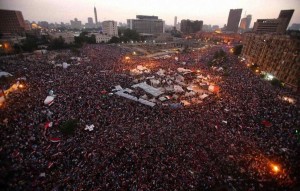Do people get used to protesting and rebelling?
It’s important to be honest here, I know very little about the current situation in Egypt and very little about Morsi’s year as President, and I absolutely don’t want to diminish any of the factors involved in the protestors being out on the street - individually or as a body - or the dangers of it. And some of these thoughts are somewhat half-baked musings, but that's what blogging is.

But, I can’t help wondering: do people get used to protest as a way of doing politics, rebellion as a way of making things happen? It starts as an alternative to an election where an election cannot be got - but does it then, once it’s been successful once, brought about an election, become an alternative that can be employed when a country’s not due an election but when a change is desired? And what happens if that happens? Obviously, not all protests are violent and most don’t start anywhere near intending to be, and yet a large number of large protests do end up there, so I don’t think it’s irrational to find it a bit concerning it if large-scale protesting is becoming a frequent recurrence (I also think it should be concerning for the government, btw) - because while most political systems don’t work as perfectly as we’d like, most of us think some kind of system or rule of law is better than the reverse.
I’ve no desire to say that there aren’t situations where it might be valid to protest against an elected government before the end of a term in office, even regardless of whether or not they’re starting to look like they might not hold elections when they’re due (like I said, I know little of the political situation of Egypt). But does Morsi have a point - even if it is a rhetorical point covering a multitude of other things - when he says:
He said his early resignation would undermine the legitimacy of his successors, creating a recipe for unending chaos. “If we changed someone in office who [was elected] according to constitutional legitimacy – well, there will be people opposing the new president too, and a week or a month later they will ask him to step down.”
It would be easy to understand why people might turn back to protest when disatisfied with the state of their country’s politics, especially if they were successful previously - because it worked, and because of the emotions caught up in the memories of the previous event - not just the adrenaline of protest, but that of unity, because that sense of unity, that belief you all want the same thing, gives you hope that you might just get it, and things might get better.
Watching a bit of the rolling news has sent me back to Ernesto Laclau (my second favourite critical theorist of my PhD years) and his book On Populist Reason, who employs such delightful phrases like:
“Since we are dealing with a totality (‘The People’) that embrances all differences, this other difference - which provides the outside that allows us to constitute the totality… is… an excluded one, something that the totality expels from itself in order to constitute itself.”
(Basically, the unity of The People comes by setting the group against some one or some group who cannot - for whatever reason - be regarded as a part of The People). He explores the way in which a populist mass - like that in Tahrir - forms, levelling out all the various different factors and grievances between them into one key opposition, and then the way this unity fractures once the immediate unifying event/issue/personality is resolved because then all the little differences between people start to emerge, and politics is no longer one simple yes or no question, but the complex usual round of niggles and options and back and forth and lesser of many evils.
To move away from Egypt’s example to the general: where are the (obviously fuzzy) borders between what you should live with after you (plural) elect a guy or a group, and what you shouldn’t? When do we say that, much as the majority of us in the west are for freedom everywhere and many of us have a natural sympathy for people protesting against the government, people should possibly live with their electoral choices for more than a year and accept that the many and diverse things that need fixing take time, and when do we say, actually, the government’s actions are too egrious not to protest. And given that there’s not actually a man on a pole with a bird’s eye view who can see and define them - when do we start to worry that we’re stepping across them and how do we know if we’re being unrealistic in our expecations and self-indulgent in our demands, and how do we know when it’s time to move?